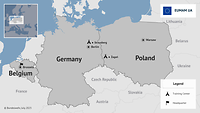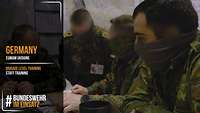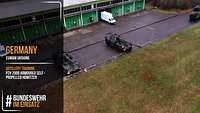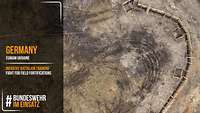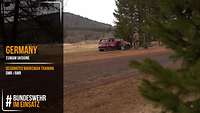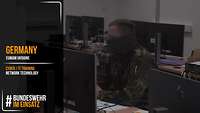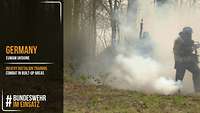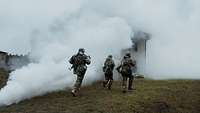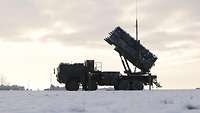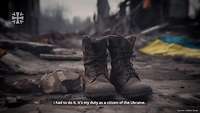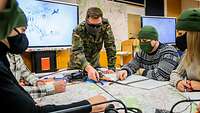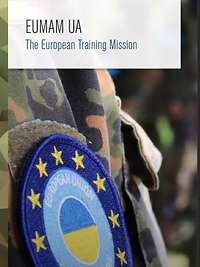Germany – EUMAM UAEuropean Union Military Assistance Mission Ukraine
The European training mission EUMAM UAEuropean Union Military Assistance Mission Ukraine is part of the support package for Ukraine in its fight against the Russian aggressor. A total of 24 European nations are participating in the mission. The task is to train Ukrainian service personnel to strengthen the country’s defence capability and sustainability.
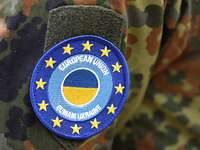
Since the Russian attack on Ukraine began in February 2022, Germany has been supporting the country in its fight against the aggressor. A crucial element of the support package is to provide training for Ukrainian service personnel regarding weapon systems, military command and control, and medical support, among other things.
The European training mission EUMAM UAEuropean Union Military Assistance Mission Ukraine
The training provided by the Bundeswehr is carried out as part of the EUEuropean Union training mission EUMAM UAEuropean Union Military Assistance Mission Ukraine (European Union Military Assistance Mission in support of Ukraine). The training mission was agreed by the EUEuropean Union member states on 17 October 2022 at the Foreign Affairs Council. It is the first training mission on European soil.
The 24 participating European nations plan to provide basic and advanced training to approximately 60,000 Ukrainian service personnel by the end of 2024. Like-minded third-party countries may also participate in the mission. The aim is to strengthen the military capabilities of the Ukrainian armed forces in such a way that they can effectively and sustainably defend their country and protect the civilian population. The equipment required for training will be provided by the EUEuropean Union member states, with common funding provided through the European Peace Facility.
Dutch Lieutenant General Michiel van der Laan, as Director of the EUEuropean Union Military Planning and Conduct Capability (MPCC) in Brussels, is in charge of EUMAMEuropean Union Military Assistance Mission at the military-strategic level. The training measures are coordinated by two multinational sister commands, the Combined Arms Training Command (CAT-C) in Poland and the Special Training Command (ST-C) in Germany. The ST-C is headed by Major General Olaf Rohde. CV Major General Olaf Rohde (PDF, 76.1 KB)
Legal basis: recognised mission but not a deployment abroad
EUMAM UAEuropean Union Military Assistance Mission Ukraine was recognised as a mission on 31 May 2023 and is now legally equivalent to other recognised missions, such as the enhanced Forward Presence in Lithuania. Recognised missions are permanent standing operational tasks with framework conditions that are comparable to a special foreign assignment. They do not constitute a deployment of armed forces as defined in the German Parliamentary Participation Act. EUMAM UAEuropean Union Military Assistance Mission Ukraine is also a mission without an executive mandate. A mandate of the German Bundestag is therefore not required.
Q&A EUMAM UAEuropean Union Military Assistance Mission Ukraine
The task of EUMAM UAEuropean Union Military Assistance Mission Ukraine is to provide basic and advanced training for the Ukrainian armed forces in order to strengthen and enable them in their defence battle against the Russian aggressor.
Germany’s training contributions include the areas of military command and control, command post training up to brigade level and combat training up to company level, training on weapon systems and equipment including their tactical use, repairs, maintenance and logistics, medical training, as well as CBRNchemical, biological, radiological, nuclear defence and mine countermeasures. All training is geared to the needs of the Ukrainian armed forces. The focus is on combat readiness and sustainability.
EUMAM UAEuropean Union Military Assistance Mission Ukraine is a mandate without executive tasks – a so-called recognised mission. Recognised missions inside NATONorth Atlantic Treaty Organization territory do not require the approval of the German Bundestag.
Up to 24 nations are participating in the mission, including Germany, Poland, Denmark, the Netherlands, Austria and the Czech Republic. The United Kingdom is conducting its own training mission at the national level.
A number of EUEuropean Union member states are supporting the mission by providing instructor contingents. The multinational Special Training Command (MN ST-C) in Strausberg near Berlin coordinates and manages all training courses for the Ukrainian armed forces conducted in Germany, regardless of which nation provides the instructors. Training in EUEuropean Union countries outside Germany is managed by the Combined Arms Training Command in Zagan, Poland.
The ST-C is a multinational entity with around 100 posts filled by partner countries, among them EUEuropean Union states such as Romania, Cyprus, Belgium, Ireland, Slovenia and the Netherlands, but also the non-EUEuropean Union state Norway. The share of Bundeswehr service personnel involved in the actual training varies depending on which training courses are in progress. On average, around 1,500 Bundeswehr personnel are involved in the mission, not only in instructor roles but also in supply roles and as translators for the Ukrainian forces. This currently makes EUMAM UAEuropean Union Military Assistance Mission Ukraine the largest mission of the Bundeswehr in terms of numbers.
The ST-C as the coordinating command element is located in Strausberg near Berlin. All other forces are assigned to the respective locations where the training takes place. The training locations and times are not made public so as to protect the German and Ukrainian service personnel.
Unlike with recognised missions abroad, there is no need for separate medical support. If required, the military personnel involved can be treated at the local Bundeswehr medical clinic. This also applies to Ukrainian service personnel in need of medical assistance.
The aim of the participating nations is to complete the training of approximately 30,000 Ukrainian service personnel within the framework of EUMAM UAEuropean Union Military Assistance Mission Ukraine by the end of 2024. So far, around 6.200 Ukrainian troops have completed training in Germany. Up to 10.000 service personnel could complete training by the end of the year.
The training is oriented towards operational requirements and focuses on essential topics so as to convey practical combat skills and knowledge in the shortest possible time. This is because Ukrainian service personnel can generally only be exempted from their assignment in Ukraine for a short time. The training contents are continuously adjusted to suit the needs of the Ukrainian forces.
The instructors are experienced expert personnel of the Bundeswehr and, in some cases, civilian maintenance personnel. Teaching materials are provided in the Ukrainian language. The training courses are also conducted in Ukrainian or Russian. German service personnel with suitable language skills are employed as translators and interpreters.
At the beginning of a training course, the participating Ukrainian service personnel receive everything they need for their training from a designated service point operated by the Bundeswehr Bekleidungsmanagement GmbHGesellschaft mit beschränkter Haftung. This is initiated by the Federal Office of Bundeswehr Equipment, Information Technology and In-Service Support. In addition to several sets of undergarments and combat uniforms, this basic equipment for instance also includes two pairs of combat boots as well as cold and wet weather protection gear. All German national insignia are removed beforehand. The Ukrainian soldiers are also issued with a sleeping bag, a combat rucksack, a mess kit and a water bottle, among many other items.
Among other systems, the Bundeswehr training focuses on the PatriotPhased Array Tracking Radar to Intercept on Target air defence system, the PzH 2000 self-propelled howitzer, the Marder infantry fighting vehicle, and the Leopard 1 and Leopard 2 main battle tanks. Some of the training is conducted on systems which the Ukrainian soldiers subsequently take with them when they return to their home country. The training content not only includes operation, repairs and maintenance, but also tactical use of the systems.
During their stay in Germany, the Bundeswehr provides the Ukrainian service personnel with everything they need. Medical support is also ensured. The training locations are not being made public so as to protect the service personnel. For reasons of military security, it is also not possible to contact the Ukrainian soldiers.
Contact persons for press and media
-

EUMAM UA
Lieutenant Colonel Jürgen Bredtmann
Branch Head of the media relations department
-

EUMAM UA
Lieutenant Colonel Christian Schneider
Contact person for questions about the EUEuropean Union-trainingmission EUMAM UAEuropean Union Military Assistance Mission Ukraine


